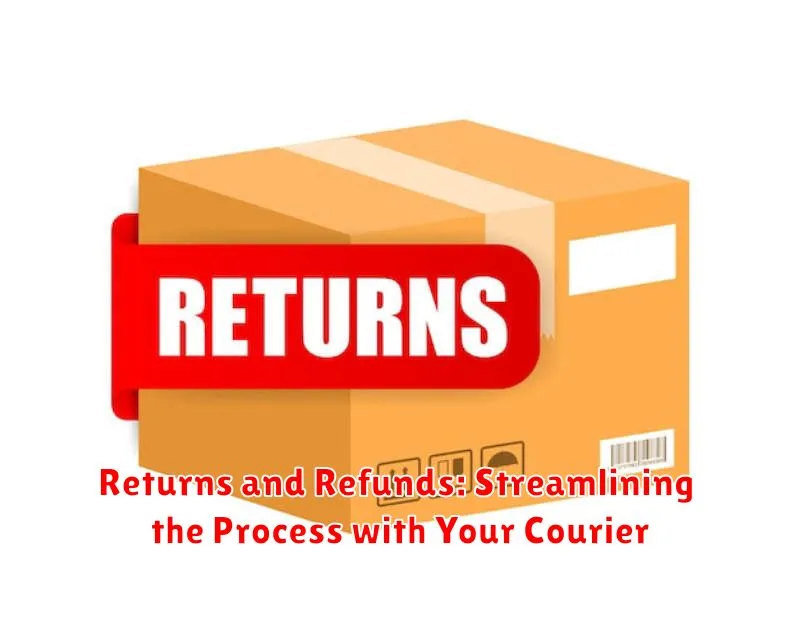In today’s competitive e-commerce landscape, choosing the right courier partner is paramount to the success of your online store. A reliable and efficient delivery service is no longer a luxury but a necessity. This comprehensive guide will equip you with the knowledge to select the perfect courier partner for your specific business needs. We will delve into the crucial factors to consider, from shipping costs and delivery speed to tracking capabilities and customer service. Making the right choice can significantly impact your customer satisfaction, brand reputation, and ultimately, your bottom line.
Whether you’re a small startup or a large established enterprise, navigating the complex world of shipping and logistics can be daunting. This guide will simplify the process, providing a clear roadmap to selecting a courier partner that aligns with your business objectives. We’ll explore various shipping options, discuss the importance of insurance and liability, and offer practical tips for negotiating contracts. By understanding the key considerations and following our expert advice, you can confidently choose a courier partner that will help your online store thrive.
Understanding Your Shipping Needs
Before diving into the world of courier services, it’s crucial to understand your own shipping requirements. A clear understanding of your needs will guide you towards the right partner and help you avoid costly mistakes.
Start by analyzing your typical order volume. Are you shipping a few packages daily, or hundreds? This will significantly impact the types of services and rates you’ll require. Next, consider your average package size and weight. Courier services often have different pricing tiers based on these factors.
Your shipping destinations are also key. Do you ship primarily domestically, or internationally? International shipping introduces complexities like customs regulations and longer transit times. Finally, think about your budget and the delivery speed your customers expect. Balancing these two is essential for finding a cost-effective and efficient solution.
Comparing Courier Services: Rates, Delivery Times, and Reliability
Once you have a clear understanding of your shipping needs, it’s time to evaluate different courier services. Comparing couriers based on key factors will help you identify the best fit for your business.
Rates: Shipping costs can significantly impact your bottom line. Compare pricing structures, including base rates, surcharges (fuel, residential delivery, etc.), and any potential discounts for volume shipping.
Delivery Times: Speed of delivery is crucial for customer satisfaction. Consider the courier’s typical delivery times for your common shipping routes, including estimated transit times and options for expedited shipping.
Reliability: A reliable courier ensures consistent and timely deliveries. Research the courier’s track record for on-time delivery, lost packages, and damage rates. Customer reviews and industry reports can provide valuable insights into their performance.
Key Features to Look For in a Courier Partner
Selecting the right courier involves examining crucial features beyond basic cost and speed. Reliability is paramount. Look for partners with consistent on-time delivery rates and minimal damage or loss incidents. A robust tracking system is essential, allowing both you and your customers to monitor shipments in real-time.
Consider the coverage area offered by the courier. Do they service all your target locations, including international destinations if needed? Customer service responsiveness is another key factor. A dedicated support team can quickly address any shipping issues that may arise.
Evaluate insurance options provided for package protection. Assess whether the courier offers flexible delivery options like scheduled deliveries, weekend deliveries, or specific time slots. Finally, consider any value-added services such as packing assistance or specialized handling for fragile items. Choosing a courier with the right features streamlines operations and enhances customer satisfaction.
Integrating Your Online Store with Your Chosen Courier

A seamless integration between your online store and your chosen courier is crucial for efficient order fulfillment. This integration automates several key processes, saving you time and reducing manual errors.
Most couriers offer APIs (Application Programming Interfaces) or plugins that can be integrated directly into popular e-commerce platforms. This connection allows for real-time shipping rate calculations at checkout, automated label generation, and automatic tracking updates for both you and your customers.
Key benefits of integration include:
- Reduced processing time: Orders are automatically transferred to the courier, eliminating manual entry.
- Improved accuracy: Automation minimizes errors in shipping information.
- Enhanced customer experience: Real-time tracking and automated updates keep customers informed.
- Streamlined operations: Integration simplifies shipping management, freeing up your time to focus on other aspects of your business.
When choosing a courier, ensure their integration options are compatible with your e-commerce platform. Check if they offer pre-built plugins or require custom development. This step ensures a smooth and efficient integration process, optimizing your order fulfillment workflow.
Negotiating Rates and Contracts
Once you’ve identified a few potential courier partners, it’s time to negotiate rates and contract terms. This step is crucial for managing your shipping costs and ensuring a smooth delivery process. Don’t be afraid to leverage your shipping volume as a bargaining tool.
Volume Discounts: Higher shipping volumes often translate to lower per-package rates. Clearly outline your projected shipping volume to potential partners. Be prepared to provide data from your sales history or realistic forecasts.
Contract Terms: Carefully review the contract terms, paying close attention to details like fuel surcharges, insurance, and liability coverage. Clarify any unclear clauses and negotiate for terms that benefit your business.
Service Level Agreements (SLAs): Establish clear SLAs with your chosen courier. These agreements should specify expected delivery times, tracking updates, and procedures for handling lost or damaged packages. Well-defined SLAs protect both your business and your customers.
Review Period: Negotiate a regular contract review period. This allows you to assess the courier’s performance and renegotiate terms based on your evolving needs and market conditions.
Managing Shipping Costs Effectively
Shipping costs are a significant factor in the profitability of your online store. Effectively managing these costs can improve your bottom line and offer competitive pricing to customers.
Negotiate Rates: Don’t be afraid to negotiate shipping rates with potential courier partners. Volume discounts and special agreements can significantly reduce expenses, especially as your shipping volume increases.
Packaging Optimization: Using appropriate and efficient packaging can minimize dimensional weight charges. Compact packaging reduces both shipping costs and environmental impact. Consider offering a variety of packaging sizes to accommodate different order sizes.
Consider Shipping Zones: Offering different shipping rates based on zones can help balance cost and customer expectations. Customers closer to your fulfillment center can receive lower shipping costs, reflecting the actual expense.
Real-Time Shipping Calculations: Integrate real-time shipping calculators into your checkout process. This provides transparency for customers and allows them to choose the best shipping option for their needs and budget.
Providing Excellent Customer Service Through Shipping
Shipping isn’t just about getting a package from point A to point B; it’s a crucial touchpoint in the customer journey that significantly impacts their overall experience. Choosing a courier partner that prioritizes customer service is essential for building loyalty and positive brand perception.
Communication is key. Customers appreciate proactive updates regarding their order status. A courier that offers tracking information and delivery notifications keeps customers informed and reduces anxiety about their purchase.
Delivery options also enhance the customer experience. Offering choices such as specific delivery windows, weekend deliveries, or pick-up locations caters to individual needs and provides flexibility. This empowers customers to choose what works best for their schedules.
Handling issues effectively is paramount. A courier’s ability to manage lost or damaged packages with efficiency and empathy directly influences customer satisfaction. A seamless resolution process, including straightforward claims procedures, is vital.
Returns and Refunds: Streamlining the Process with Your Courier

A smooth returns and refunds process is crucial for customer satisfaction and can significantly impact your online store’s success. Your chosen courier plays a vital role in this process.
Consider couriers that offer prepaid return labels and easy-to-use return portals. This simplifies the process for customers and reduces inquiries to your customer service team.
Clear communication with your courier regarding return shipping costs and procedures is essential. Negotiate favorable rates for return shipping and establish a clear process for handling damaged or lost returns.
Integrating your courier’s tracking system with your online store allows customers to monitor the status of their returns, increasing transparency and reducing anxiety.
Evaluate the courier’s return processing time. Faster processing means quicker refunds for customers and improved inventory management for your business.
Scaling Your Shipping Strategy as Your Business Grows
As your online store expands, your shipping strategy needs to adapt. Choosing a courier partner that can scale with you is critical for continued success. This means looking beyond current needs and anticipating future shipping volumes and geographical reach.
Consider couriers that offer flexible pricing tiers and volume discounts. Negotiating favorable rates as your shipment volume increases can significantly impact profitability. Also, explore couriers with established international shipping capabilities if expansion into global markets is on your horizon.
Automation is key to efficient scaling. Look for couriers that integrate seamlessly with your existing platform and offer features like automated label generation and real-time tracking updates. This reduces manual workload and allows your team to focus on other growth-related tasks.
Finally, regularly evaluate your shipping strategy and courier performance. As your business evolves, your needs will change. Consistent evaluation ensures your shipping process remains optimized for efficiency and customer satisfaction.

